Has your furry friend been giving you fishy-faced smooches lately? If you’ve ever cuddled up with your canine only to be greeted by an unexpectedly fishy scent wafting from their mouth, you’re not alone. As devoted pet parents, any change in our dog’s behavior or health, including the sudden emergence of bad breath, can leave us concerned and searching for answers. This unmistakable and sometimes unpleasant fishy odor isn’t just a random occurrence; it could be a signal of various factors at play in your dog’s health and diet. In this blog post, we’ll delve into the mysterious realm of ‘fishy dog breath’, exploring its potential causes and offering tried-and-true remedies. From dietary choices to underlying health issues, let’s unravel this olfactory enigma together and ensure your pup’s mouth remains as fresh as a daisy—or at least as fresh as doggedly possible! 🐶💨🐟
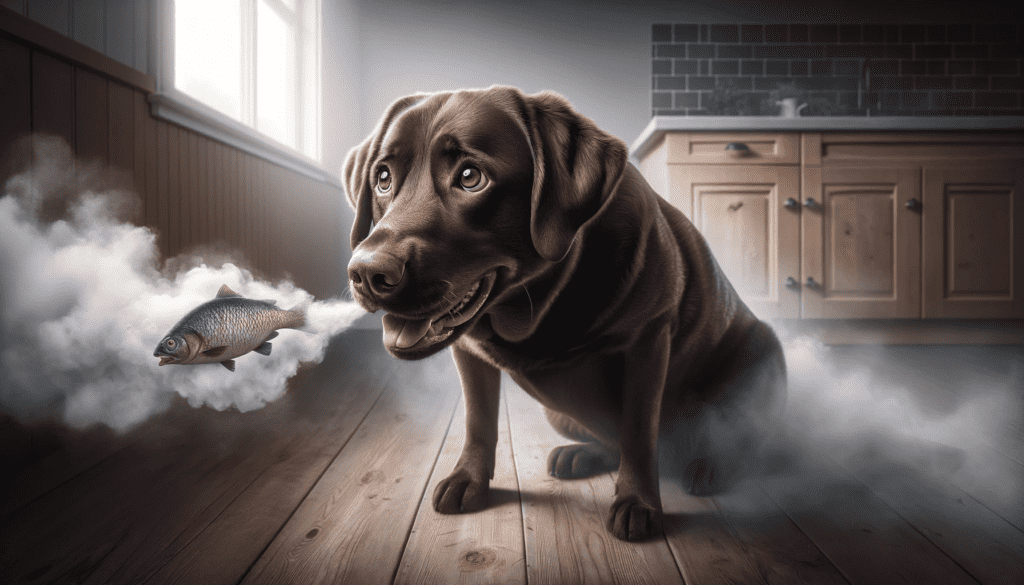
Why Does Dog Breath Smells Like Fish?
When you lean in for a snug embrace with your pooch and are met with a waft of fishiness, it’s natural to wonder where that scent is coming from, especially if their menu doesn’t regularly feature seafood. Let’s venture deep into the causes of this particular canine conundrum.
1. Your Dog’s Breath Smells Like Fish Because You Feed Them Fish
While it might seem like a “well, duh” moment, it’s essential to start with the basics.
- How does it happen?
If your dog’s diet primarily consists of fish-based kibble or if you treat them to fish-flavored snacks, then the residue from these foods can linger in their mouth. The natural oils and components of fish can have a lasting scent, especially if your dog isn’t drinking a lot of water to help wash it down. - What can you do?
If you think this is the primary cause, consider brushing your dog’s teeth after meals or offering dental chews to help neutralize the odor. Additionally, ensure they have constant access to fresh water.

2. Your Dog’s Breath Smells Like Fish Because They’re Eating Something Gross
Dogs’ curiosity knows no bounds, and sometimes, their adventures lead them to some smelly discoveries.
- How does it happen?
Whether it’s rummaging through the garbage or rolling in something unsavory at the park, dogs have a knack for finding things we’d rather they avoid. Leftovers or decomposing organic matter can emit a fishy scent. - What can you do?
Keep a close eye on your dog during walks and ensure your trash is dog-proof. Regularly clean their toys, and consider providing them with stimulating toys at home to divert their attention from scavenging.

3. Your Dog’s Breath Smells Like Fish Because They Have Tooth Issues
Oral health is a major player when it comes to breath issues.
- How does it happen?
Plaque and tartar can accumulate on your dog’s teeth over time. If not addressed, this buildup can lead to bacterial growth, gum diseases, and infections, potentially giving off that fishy odor. - What can you do?
Regular dental check-ups are crucial. At home, brushing your dog’s teeth, providing dental chews, and using dog-friendly mouthwash can make a difference. If the problem persists, see a veterinarian.
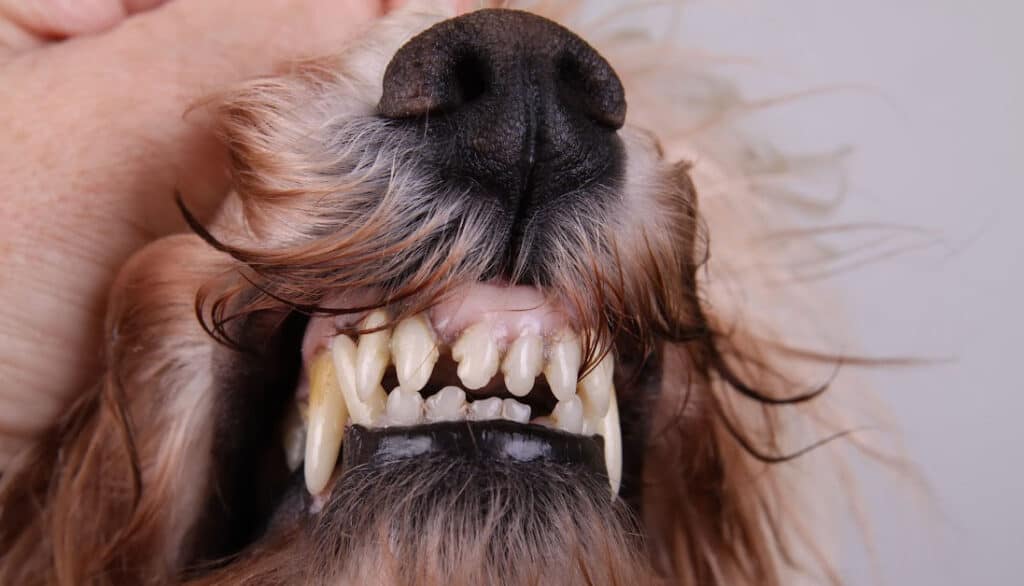
4. Your Dog’s Breath Smells Like Fish Because of Anal Gland Expression
A bit of an “icky” topic, but crucial to address.
- How does it happen?
Dogs have two small anal glands that can become filled with fluid. When these glands are expressed, either naturally or manually, they release a distinct fishy odor. If a dog licks or cleans that area, the smell can transfer to their mouth. - What can you do?
If you notice your dog scooting on the floor or excessively licking their rear, it might be time for a vet visit. They can check the glands and express them if needed.

5. Your Dog’s Breath Smells Like Fish Because They Have an Infection
Beyond dental issues, other infections can be culprits.
- How does it happen?
Respiratory, gastrointestinal, or other systemic infections can sometimes manifest as bad breath in dogs. The presence of harmful bacteria or yeast can give off a variety of odors, including fishy ones. - What can you do?
If you suspect an infection, especially if accompanied by other symptoms like lethargy, loss of appetite, or changes in behavior, it’s essential to consult with a veterinarian.
There’s a whole world of causes behind that fishy dog breath, and understanding them is the first step towards a fresher future for your furry friend. Remember, when in doubt, always lean on the expertise of a trusted vet. They’ll steer both you and your pup in the right direction. 🐕🐟🦷
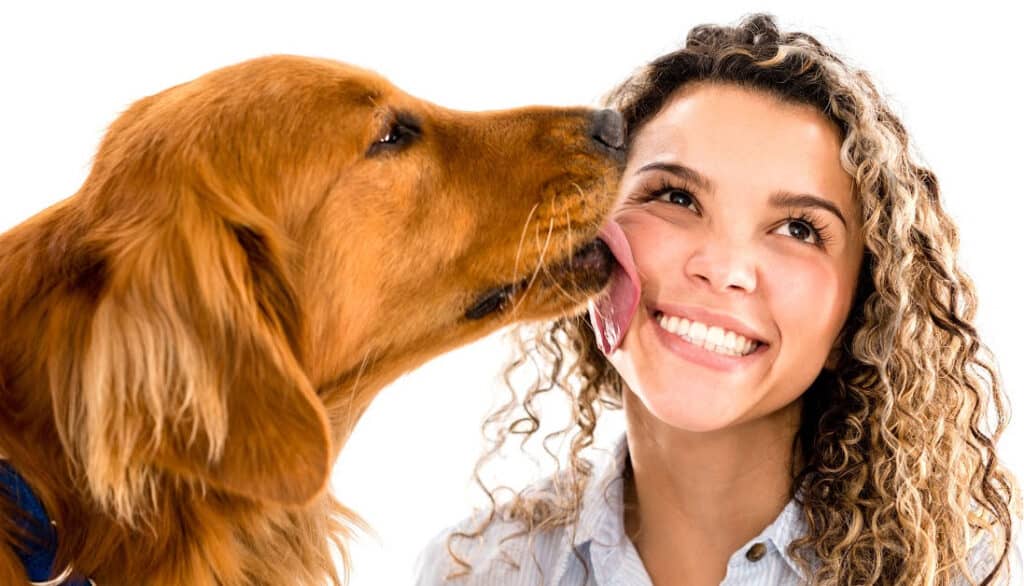
When Should You Worry About Fishy Dog Breath?
Loving a dog means embracing all of them—even their occasional fishy breath. However, while some reasons for that peculiar aroma can be harmless or temporary, others might signal underlying health issues that require attention. Let’s decipher when it’s merely a fleeting scent and when it might be time to raise a brow (and perhaps pay the vet a visit).
Occasional vs. Persistent Fishy Breath
- Occasional:
If your dog’s fishy breath appears sporadically, especially after specific meals or treats, it might just be a transient result of their diet or something they chewed on during a walk. In such cases, it often dissipates within a few hours. - Persistent:
However, if the fishy odor is continuous, lingers for days, or grows stronger, it could be indicative of a more serious issue. From dental problems to infections, persistent bad breath shouldn’t be ignored.

Accompanying Symptoms
Fishy breath alone might not be alarming, but when coupled with other symptoms, it’s essential to take notice:
- Lethargy or Decreased Energy: A dog that’s less playful or sleeps more than usual might be experiencing discomfort or pain.
- Loss of Appetite: If they’re turning their nose up at their favorite treats or meals, something could be amiss.
- Excessive Drinking or Urination: Changes in their drinking habits or frequent urination could indicate kidney issues or other internal problems.
- Visible Dental Problems: Brownish-yellow tartar, swollen gums, or bleeding can suggest dental diseases.
- Behavioral Changes: Scooting on the floor, excessive licking, or showing signs of distress can point to problems like anal gland issues or infections.
Age Factor
Just like humans, as dogs age, they become more susceptible to health issues. Senior dogs might face a higher risk of dental diseases, organ problems, or infections. If your older dog starts displaying fishy breath, especially if it’s a new development, it’s prudent to consult with a vet.
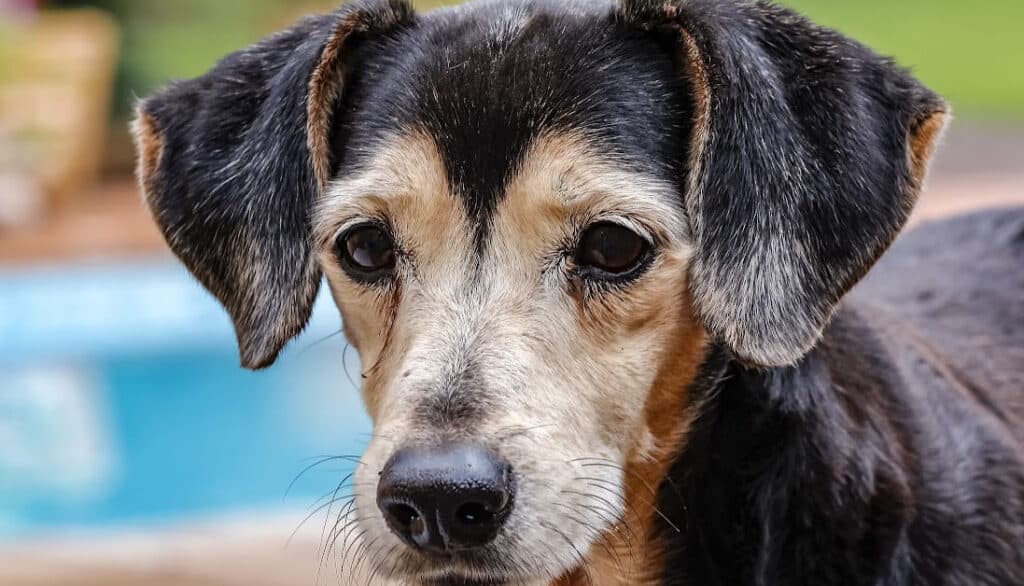
Previous Health Issues
If your dog has had past health problems, especially related to their dental health, organs, or infections, then any recurrence of fishy breath might be an early warning sign of a recurring or related issue.
While our four-legged buddies can’t verbalize how they feel, they give us clues through their behavior and, in this case, their breath. Occasional fishy breath can be a common part of the doggy experience, but if it’s persistent or paired with other troubling symptoms, it’s a good idea to get professional advice. Always trust your instincts as a pet parent—if something feels off, it’s better to be safe and get your dog checked out. After all, their well-being is always worth that extra mile. 🐾🐶🚑

Tips For Treating Your Dog’s Bad Breath
No dog parent relishes the experience of being greeted with a waft of foul breath as their furry friend leans in for a cuddle. The good news is that most cases of bad breath in dogs can be addressed with some proactive measures. Let’s navigate the various ways you can combat that stinky situation and keep your pup’s breath fresh and clean.
1. Dental Hygiene is Paramount
- Regular Brushing: Invest in a dog-friendly toothbrush and toothpaste. Brushing your dog’s teeth several times a week can help reduce plaque and tartar buildup. Remember, human toothpaste isn’t safe for dogs, so ensure you get a product designed for canine use.
- Dental Chews: There are several dog chews available that are designed to clean your dog’s teeth as they gnaw on them. They can be a great supplement to brushing.
- Professional Cleanings: Consider getting your dog’s teeth professionally cleaned once a year or as recommended by your vet. This deep clean can prevent dental diseases and refresh your dog’s oral hygiene.
2. Monitor Their Die
- Quality Food: Ensure that you’re feeding your dog high-quality dog food. Cheap or low-quality foods might not only be less nutritious but can also contribute to bad breath.
- Fresh Water: Always provide your dog with fresh water, ensuring they stay hydrated and helping rinse away food particles from their mouth.
- Additives: There are water additives available that can help combat bad breath. They work by neutralizing odor-causing bacteria in the mouth.
3. Provide Safe Chew Toys
- Durable Toys: Chew toys can help reduce tartar and keep your dog’s gums healthy. Ensure the toys are safe and appropriate for your dog’s size and chewing habits.
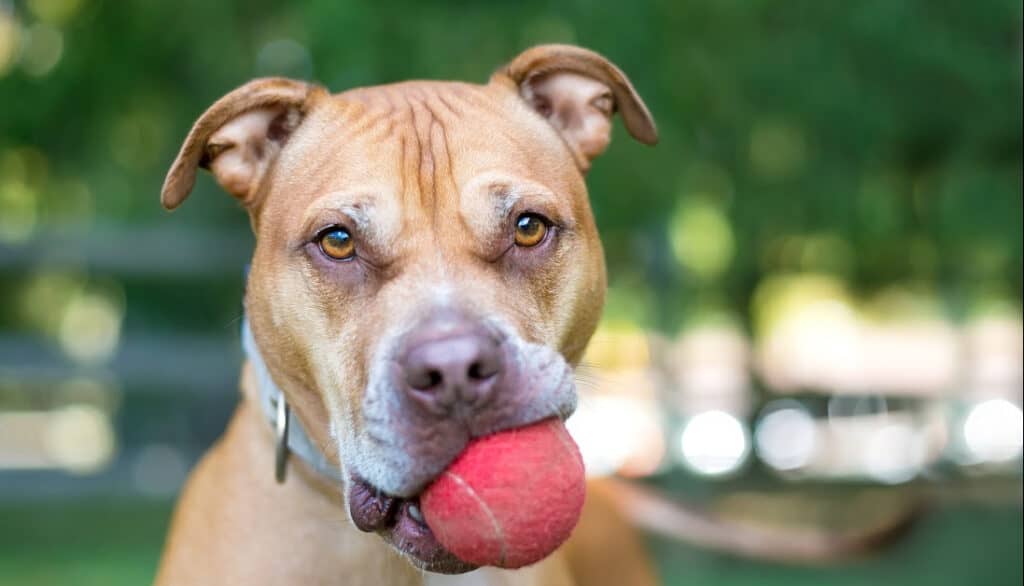
4. Regular Vet Check-ups
- Routine Visits: Regular vet visits can help catch potential oral health issues before they become severe. Your vet can offer guidance on oral care routines tailored to your dog’s needs.
5. Natural Remedies
- Parsley: Adding some chopped parsley to your dog’s food can serve as a natural breath freshener.
- Coconut Oil: A small amount of coconut oil can act as a natural toothpaste and mouth freshener for dogs. Many dogs also love the taste!
- Probiotics: Consider adding dog-friendly probiotics to their diet. It can help balance the bacteria in your dog’s gut, leading to fresher breath.
6. Avoid Human Foods
Certain human foods like onions, garlic, and spicy foods can exacerbate bad breath issues in dogs. Ensure your dog doesn’t have access to these.
7. Be Aware of Underlying Health Issues
Persistent bad breath can sometimes be a sign of underlying health problems, including diabetes, kidney issues, or gastrointestinal diseases. If the bad breath continues even after trying multiple remedies, it’s essential to see a vet.
Combatting your dog’s bad breath requires a mix of proactive care, awareness, and sometimes professional intervention. With the right habits in place, you can ensure that your fur buddy’s kisses are always welcome and that their oral health remains in top shape. 🐶💋

Conclusion
Navigating the sometimes-winding roads of pet ownership brings with it joys, surprises, and a few head-scratching moments. One such moment might be pondering why our beloved canine’s breath occasionally mimics the scent of the sea. From dietary choices to health concerns, the reasons can be varied, but understanding them is crucial for our pets’ well-being.
We’ve dived deep into the causes, learned when to raise alarms, and explored actionable steps to keep our dog’s breath as fresh as a daisy. Remember, as with many aspects of pet care, prevention is often the best medicine. Regular check-ups, a keen eye on their habits, and timely interventions can ensure that our dogs stay healthy and happy.
As always, trust your instincts as a pet owner. You know your furry friend better than anyone else. When in doubt, always lean on the expertise of trusted veterinarians and pet care professionals.
Thank you for joining us on this exploratory journey. Here’s to many more fresh-breathed cuddles and kisses with your four-legged companion! 🐾🌼🐶
Frequently Asked Questions
No, it’s not typical for dogs to have persistent bad breath. While occasional foul breath after eating certain foods might be expected, consistent bad breath could be indicative of underlying issues, ranging from dental problems to more severe health concerns.
Ideally, you should brush your dog’s teeth daily, but several times a week at a minimum is recommended. Regular brushing helps prevent the buildup of plaque and tartar, which are primary culprits of bad breath.
No, you should never use human toothpaste for your dog. Many human toothpastes contain ingredients like xylitol, which is toxic to dogs. Always use toothpaste formulated specifically for canine use.
Several reasons can cause a fishy odor in your dog’s breath, aside from consuming fish. These include issues with their anal glands, certain infections, dental problems, or what they might have scavenged outside. It’s essential to evaluate their overall behavior and consult a vet if the smell persists.
Yes, a change in diet can make a difference. Ensure you’re feeding your dog high-quality food that is free from unnecessary fillers and additives. Some foods are formulated specifically to promote dental health. Fresh water, dental chews, and specific treats designed to improve breath can also help. However, always consult with a veterinarian before making significant changes to your dog’s diet.
